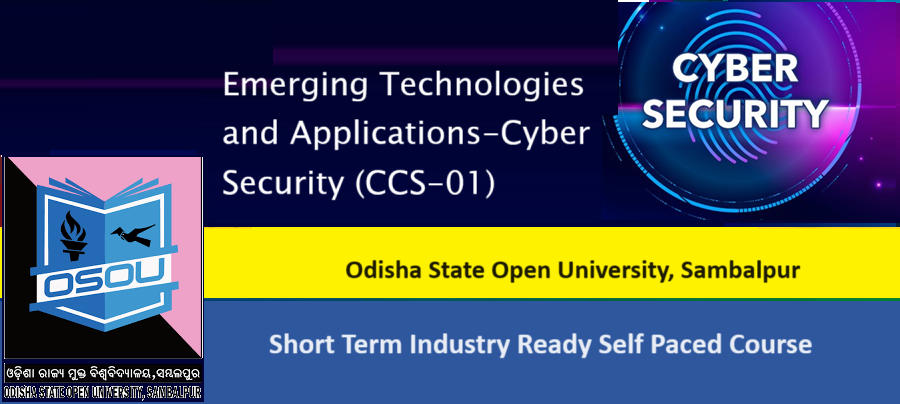

Note: Please check your Spam or Junk folder, in case you didn't receive the email with verification code.
Linear: Sequential Order
CERTIFICATION COURSES
INSTRUCTIONAL DESIGN
The university offers Online Self-paced Learning courses of about 60 hours with 4 credits each. These courses are designed to provide a comprehensive and engaging learning experience, adopting of (4) Four-Quadrant Approach i.e., eContent, eTutorials, Self-Assessments and Discussion Board.
METHODOLOGY
To ensure effective understanding, knowledge retention and practical applications, these courses use the following methodology:
1. Self-paced online course delivered with four-quadrant approach
2. Unit-wise Structured Course with
3. Modular MCQ-based Self-Assessments
4. Assignments for Practical Applications
5. 24x7 Online Community Support from Peers and Faculty
6. Periodic Live Interactive Sessions by Industry Professionals
7. Flexible Course Duration with a minimum of 1 month to a maximum of 1 year.
8. Final Examination (3 hours) after completing 60 hours of learning
a. Early Examination in limited centres near Regional Centres (RCs)
b. Regular Examination twice a year (Semester Pattern) near the students’ location.
Course Objectives
1. Understand fundamental concepts and principles of cyber security
2. Develop knowledge of various types of cyber threats and attack vectors
3. Learn techniques for securing networks, systems, and applications
4. Understand cryptography and its applications in cyber security
5. Develop skills in risk assessment and management in the context of information security
6. Gain practical experience in implementing security measures and responding to incidents
Course Outcomes
By the end of this course, students will be able to:
1. Explain core cyber security concepts and their importance in the digital landscape
2. Identify and analyze various types of cyber threats and vulnerabilities
3. Implement basic security measures to protect networks, systems, and data
4. Apply cryptographic techniques to ensure data confidentiality and integrity
5. Conduct basic risk assessments and develop security policies
6. Demonstrate understanding of ethical and legal issues in cyber security
7. Perform basic digital forensics and incident response procedures
8. Implement access control and authentication mechanisms
9. Understand and apply secure coding practices
10. Evaluate and recommend appropriate security solutions for different scenarios
. Overview of cyber security landscape
Overview of cyber security landscape
 CIA triad Confidentiality Integrity and Availability
CIA triad Confidentiality Integrity and Availability
 Types of cyber threats and attack vectors
Types of cyber threats and attack vectors
 Assessment
5 Questions
Assessment
5 Questions
 Network protocols and vulnerabilities
Network protocols and vulnerabilities
 Firewalls and intrusion detectionprevention systems
Firewalls and intrusion detectionprevention systems
 Virtual Private Networks (VPNs)
Virtual Private Networks (VPNs)
 Wireless network security
Wireless network security
 Assessment
5 Questions
Assessment
5 Questions
 Operating System Security
Operating System Security
 Endpoint protection
Endpoint protection
 Patch management and system hardening
Patch management and system hardening
 Virtualization and cloud security basics
Virtualization and cloud security basics
 Assessment
5 Questions
Assessment
5 Questions
 Symmetric and asymmetric encryption
Symmetric and asymmetric encryption
 Hash functions and digital signatures
Hash functions and digital signatures
 Public Key Infrastructure (PKI)
Public Key Infrastructure (PKI)
 SSLTLS and secure communication
SSLTLS and secure communication
 Assessment
5 Questions
Assessment
5 Questions
 Authentication Methods and Protocols
Authentication Methods and Protocols
 Multifactor authentication
Multifactor authentication
 Access control models _DAC MAC RBAC
Access control models _DAC MAC RBAC
 Single Sign-On (SSO) and federation
Single Sign-On (SSO) and federation
 Assessment
5 Questions
Assessment
5 Questions
 OWASP Top 10 vulnerabilities
OWASP Top 10 vulnerabilities
 Cross-Site Scripting -XSS-and SQL injection
Cross-Site Scripting -XSS-and SQL injection
 Security headers and secure cookies
Security headers and secure cookies
 Web Application Firewall
Web Application Firewall
 Assessment
5 Questions
Assessment
5 Questions
 Types of Malware (viruses worms trojans ransomware)
Types of Malware (viruses worms trojans ransomware)
 Malware detection and analysis techniques
Malware detection and analysis techniques
 Anti-malware strategies and tools
Anti-malware strategies and tools
 Assessment
5 Questions
Assessment
5 Questions
 Security Information & Event Management (SIEM)
Security Information & Event Management (SIEM)
 Incident detection and triage
Incident detection and triage
 Incident response planning and execution
Incident response planning and execution
 Digital forensics basics
Digital forensics basics
 Assessment
5 Questions
Assessment
5 Questions
 Risk assessment methodologies
Risk assessment methodologies
 Developing security policies and procedures
Developing security policies and procedures
 Business continuity and disaster recovery planning
Business continuity and disaster recovery planning
 Compliance and regulatory requirements
Compliance and regulatory requirements
 Assessment
5 Questions
Assessment
5 Questions
 Secure coding practices
Secure coding practices
 Software Development Life Cycle (SDLC) security
Software Development Life Cycle (SDLC) security
 Code review and static analysis tools
Code review and static analysis tools
 DevSecOps principles
DevSecOps principles
 Assessment
5 Questions
Assessment
5 Questions
 Mobile device management
Mobile device management
 App security and OWASP Mobile
App security and OWASP Mobile
 IoT security challenges and best practices
IoT security challenges and best practices
 Securing smart home and industrial IoT devices
Securing smart home and industrial IoT devices
 Assessment
5 Questions
Assessment
5 Questions
 Cloud service models and their security implications
Cloud service models and their security implications
 Shared responsibility model
Shared responsibility model
 Cloud-specific threats and mitigation strategies
Cloud-specific threats and mitigation strategies
 Cloud security best practices and tools
Cloud security best practices and tools
 Assessment
5 Questions
Assessment
5 Questions
 Ethical hacking methodology
Ethical hacking methodology
 Reconnaissance and scanning techniques
Reconnaissance and scanning techniques
 Exploitation and post-exploitation
Exploitation and post-exploitation
 Reporting and remediation
Reporting and remediation
 Assessment
5 Questions
Assessment
5 Questions
 Artificial Intelligence and Machine Learning in security
Artificial Intelligence and Machine Learning in security
 Blockchain and its security implications
Blockchain and its security implications
 Quantum computing and post-quantum cryptography
Quantum computing and post-quantum cryptography
 Zero Trust security model
Zero Trust security model
 Assessment
5 Questions
Assessment
5 Questions
 Cybercrime and cyber law basics
Cybercrime and cyber law basics
 Ethical considerations in security research
Ethical considerations in security research
 Privacy regulations and data protection
Privacy regulations and data protection
 Professional ethics for security practitioners
Professional ethics for security practitioners
 Assessment
5 Questions
Assessment
5 Questions
 Final Assessment
50 Questions
Final Assessment
50 Questions
The certificate issued for the Course will have
Only the e-certificate will be made available. No Hard copies. The certificates issued by Odisha State Open University, Sambalpur. can be e-verifiable at www.ulektzskills.com/verify.



 60 hours Learning Content
60 hours Learning Content 100% online Courses
100% online Courses English Language
English Language Certifications
Certifications